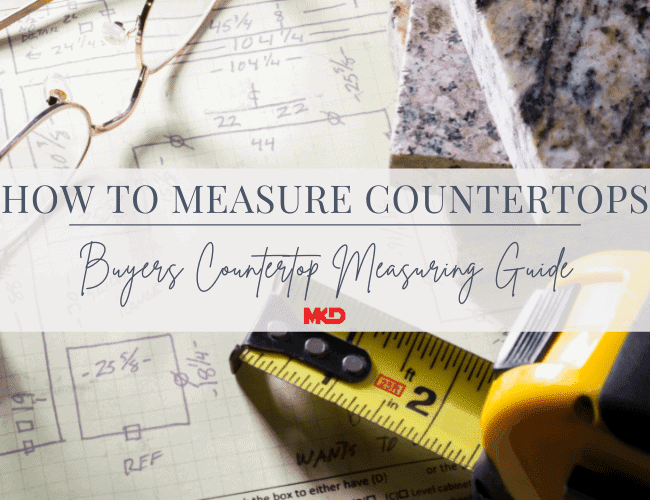If you’re looking to overhaul the look of your kitchen, changing up your countertop is one of the most impactful things you can do. And knowing how to measure countertops accurately is important to ensure a smooth replacement. Maybe you’ve been browsing Pinterest and taking screenshots of your favorite countertops, or making mental notes on your preference for granite over quartz—and now you’re ready to take action. But where to start?
When just starting out with any renovation, getting a clear idea of your budget is key. Replacing your countertops can be one of the costlier aspects of any kitchen renovation, so you’ll want to make sure to get an accurate measurement of your countertop first.
Knowing the exact size of your countertop can help a countertop installation company give you a more precise quote for the project. After all, most people proportion about ten percent of their kitchen renovation budget for countertop materials and installation alone, and knowing this ahead of time can help you properly prepare.
Luckily enough, measuring out your countertops at home isn’t all that hard. So get ready to break out a tape measure, enlist some helping hands, and find out exactly how to accurately measure the size of your existing countertops.
Measuring Out Your Kitchen Countertops Ahead of a Quote
When it comes to figuring out the size of your kitchen countertops, just follow these three steps:
1. Sketch Things Out
2. Get Measuring
3. Make Your Calculations
4. It’s really that easy!
You’ll need to make sure you’ve got the following supplies on hand:
1. A standard measuring tape (in inches)
2. A pencil
3. Paper for sketching (grid paper can help you draw straight lines, but any will do)
4. A calculator (the calculator app on your phone works)
Now, here’s how to put the steps into action. (Feel free to take a screenshot of this page, too, for reference.)
1. Sketch Things Out
There’s nothing quite like getting a great plan down on paper. And when it comes to renovating your kitchen countertops, making a mockup of the dimensions of your countertops can be helpful to everyone.
Don’t fret if you’re no Da Vinci, or never received professional architectural training—this is just to give you a sense of the scope of the project, and your drawing doesn’t necessarily have to be to scale.
You do, however, want to make note of the following features in your kitchen:
– The location of your sink. Include type of sink, whether it’s a farmhouse sink, bar sink, corner sink, etc.
– Location of your stove, range, or cooktop.
– The exposed edges of your countertop. These will have to be smoothed and polished.
– Location of any adjacent appliances. A fridge, for example.
 2. Get Measuring
2. Get Measuring
With your sketch in hand, now it’s time to get down to measuring.
Although this task is easily and comfortably accomplished solo, feel free to recruit the help of a partner, your kids, or anyone around if you need help balancing the tape measure, or just want to make sure it doesn’t angrily snap back at you!
Using your tape measure, measure the width and length (in inches) of each piece on your sketch, and mark them according to your paper.
It’s important to measure from wall-to-wall, and not just the current length of your countertops.
You’ll also want to include the spaces for any sinks or cooktops, as this will be factored into the total size of the countertop that you purchase.
You can also measure the depth of your countertop beneath your cabinets to the wall, although it can be helpful to note that the standard depth for most countertops is 25.5 inches (24-cabinets and 1.5 inches of overhang.)
The standard amount of overhang for an island can also be up to 12 inches (a foot) in length, which you may also want to factor in.
Finally, don’t forget to measure everything twice—it will only lead to confusion later if you’re quoted less or more than what you actually need.
3. Make Your Calculations
We’ve reached the math portion. Don’t worry if you’ve forgotten most (or all) of what you learned in geometry class, because these calculations are pretty simple.
Countertops and other surfaces are measured in square feet. You calculate the surface area of your countertop by multiplying the length and width of a section in square inches.
For example, if your island is 48’’ x 72’’, the surface area of your island is 3,456 sq. inches.
Repeat the calculation for any other pieces you have, and add each of the sections up.
For example, if you have one other section measuring 1,900 sq. inches, you add that to the size of your island to get the total size in square inches. In this case, that would be 5,356 sq. inches.
Finally, divide this total figure by 144 (12 inches per ft squared) to get the size of your countertop in square feet.
In our example, this would look like 5,356/144 = 37.2 sq. feet (rounded to the tens place).
Rounding up is a good way to make sure you work with the least amount of decimals possible.
These same measurements can be used to determine the length of your edges that need to be polished.
Download MKD’s Countertop Measuring Guide
Click the button below to download the PDF Infographic version of our guide. This download summarizes the information above into an easy-to-use printable resource to be used when measuring your countertops.
Contact a Countertop Remodeling Company for More Info
Measuring your countertops at home is a great way to get an estimate of the total cost of your remodeling project without having to even leave your home.
With that being said, countertops can be tricky. Measuring complex areas with uneven curves or rounded edges can be challenging for folks unfamiliar with the process. Finally, the physical task of working with stone or other heavy kitchen materials isn’t something that should be left to the inexperienced.
Countertop Installation Feature | Calacatta Venice
Taking on a project of this scope and size requires the input of expert kitchen renovators. At Michigan Kitchen Distributors, we’re a family-run business backed by decades of experience in the kitchen and bath remodeling and renovation industry.





 2. Get Measuring
2. Get Measuring






